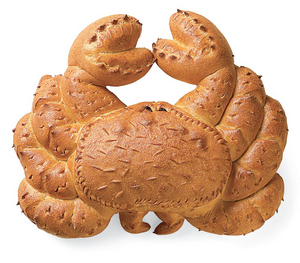Grain
A grain comes from almost every single food that provides carbohydrates. There are two types of grains: dry grains and wet grains. Dry grains usually come from foods such as bread, cereal and pasta. Wet grains mostly come from legumes (like beans) and animals, mostly crabs. The bread crab (pictured) is the most valuable source of dry and wet grains, as it combines both bread and a crab. They're usually seen in your local bakery and in the beach.
Somehow, they managed to have the most durable crop of all time than any other staple food in the world. They can be mechanically harvested and they're durable enough to be transported anywhere. Not only has grains been made into food, but due to their durability, they can be made into knives and guns.
Raw grains taste like dust if you eat them.
Cereal[edit | edit source]
Most cereal comes from grains. Some of them grow up to be cereal killers after they haven't been bought in the stores they're in. Notable brands include Cheerios, Toasty O's, and any cereal with the word "grain" or "wheat" in its name. They always taste like sawdust and are very dry. Therefore, if you want to make cereal edible you should pour milk on it.
Types[edit | edit source]
Contrary to popular belief, there is another definition for the word "cereal". It could refer to grass composed of many scientific parts. Pseudocereals are a type of grain that will not allow you to make cereal out of like chia and quinoa. There's also pulses (but that just mostly consists of beans). The most common type of grains are wheat, because many people eat them. Other common grains include barley, oats, and rice.
Trade[edit | edit source]
Grains are the most versatile item to be traded, due to their small size. Despite being one of the most consumed things in the world, grain prices are rising due to, well, obviously, inflation. Grains are also used as a weapon of mass destruction, as grain dust can be used to create explosives.

